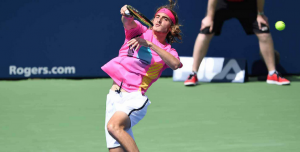Greek Stefanos Tsitsipas produced a stunning comeback on Friday, saving two match points to upset defending champion Alexander Zverev 3-6, 7-6(11), 6-4 at the Rogers Cup.
The 19-year-old hit 28 winners, including 18 on his forehand side, to come from 3-6, 2-5 down and stun the second seed after two hours and 27 minutes. Tsitsipas becomes the youngest player since Rafael Nadal in 2006 (Monte-Carlo) to conquer three Top 10 opponents in a single tournament.
“Achieving such things makes me feel nice,” said Tsitsipas. “I’m very proud of who I am and at this age to have these kind of results, which I never expected. I always thought it’s going to be take more years for this to happen. But with the hard work that I’ve been doing, it’s no surprise to me. I believe I have the game to compete against these players. I’m feeling very confident.”
In his maiden ATP World Tour Masters 1000 semi-final, Tsitsipas will face World No. 6 Kevin Anderson for a place in Sunday’s final. He is bidding to become the youngest player to claim four successive Top 10 wins at the same event since the ATP World Tour was established in 1990.
Tsitsipas leads their FedEx ATP Head2Head series 1-0 after winning their only previous meeting at the Millennium Estoril Open in May. Tsitispas, currently ranked at a career-high No. 27 in the ATP Rankings, is guaranteed to break into the Top 20 for the first time on 13 August.
“[Kevin is] a very tough opponent to face on hard courts. He has a huge serve. He can be really dangerous. He’s attacking a lot and takes the ball early. So again, I’m walking into [the match] with low expectations. I know he’s the favorite again,” admitted Tsitsipas.
“I’m going to try to remain calm. I know he’s going to ace a lot tomorrow. He’s going to be put pressure with his serve and his returns. So I’m ready for that and it’s going to be a tough match… It’s an opportunity to do again well in this tournament, even better. I’m going to try to use my chances as much as I can.”
Friday’s quarter-final ended in dramatic fashion. Serving at 30/15, Zverev elected to not use one of two remaining challenges after his inside-out forehand was called out, but on TV review was shown to catch a big part of the line. At 30-all, the German made a clunky attempt at a low backhand volley, which sailed long. He then sent a second serve well long to hand Tsitsipas the match.
Zverev was bidding to win the Washington, D.C.-Canada double for the second successive year. The 21-year-old, who drops to 43-12 this season, defeated Alex de Minaur to retain his Citi Open title without dropping a set last week.
“I mean, I was up 6-3, 5-3, serving for the match. So it should have been a three and three match, and then I would have been [in press] about one-and-a-half hours ago,” said Zverev. “But now I’m going to go to Cincinnati. I’ll do everything I can to prepare myself there and play well there. But as I said, I didn’t feel the ball at all. I didn’t play well. So a lot of it didn’t depend on me.”
After falling behind an early break, Zverev capitalised on forehand errors from Tsitsipas and took risks on his own forehand to earn successive breaks for a 3-2 lead. The German began to find rhythm on serve from there, dropping just one point in his following two service games to establish control before lifting his aggression and taking the set after 31 minutes.
A rifled backhand winner and pinpoint forehand return from Zverev applied pressure to Tsitsipas in the fourth game of the second set, who surrendered his serve after multiple mistimed forehands. Zverev looked focussed as he served for the match at 5-3, before Tsitsipas found his best level. The Barcelona Open Banc Sabadell finalist found inspiration on his forehand and soon levelled the match at 5-5 to extend the encounter.
“I was just walking the ball back and making him play every single ball,” said Tsitsipas. “At [5-3], he wasn’t into it. He started missing. He got tighter, I think. He understood that’s his chance to close the match. I just did things right and, yeah, I broke him. That’s how you break, if you play things right and you play clever. And I did that, and I was back in the match again.”
A stunning tie-break soon followed, with both men showing flashes of brilliance and nerves under intense pressure. But it was Tsitsipas who showcased the greater variety, mixing brutal backhands and delicate drop shots to level the match on his fifth set point, after saving two match points, after Zverev misfired on his backhand side.
“We played a hell of a tie-break,” said Tsitsipas. “We played lots of points, lots of rallies. A really exciting tie-break. The people seemed to love it… [In the third set] I was a bit worried about [my first serve percentage].
“If I’m going to keep my first serve percentage higher. And it still didn’t work that well for me. He had plenty of break point opportunities on my serve. He didn’t convert them… I used my chances in the last game. I made him play and I was very patient. It paid off at the end.”
After trading early breaks, the decisive moment came in the 10th, and final, game of the decider. After failing to convert three break points in the previous game, Zverev looked set to level the third set at 5-all before a series of dramatic events.
Serving at 30/15, he elected to not use one of two remaining challenges after his inside-out forehand was called out, but on TV review was shown to catch a big part of the line. At 30-all, the German made a clunky attempt at a low backhand volley, which sailed long. He then sent a second serve well long to hand Tsitsipas the match.
Source: atpworldtour
Ask me anything
Explore related questions





